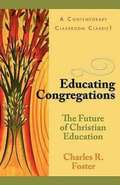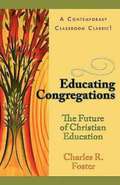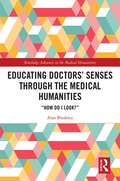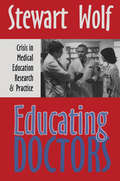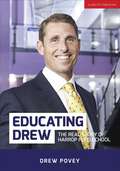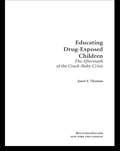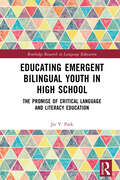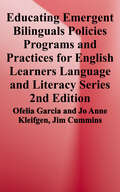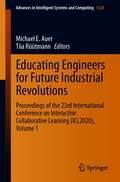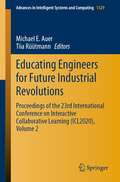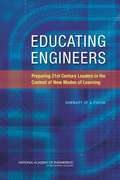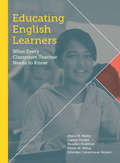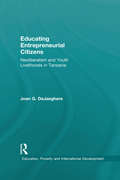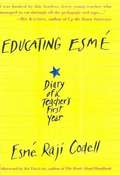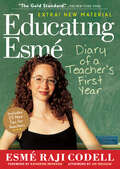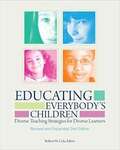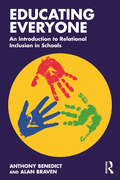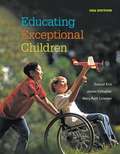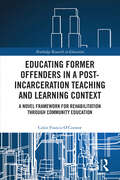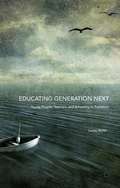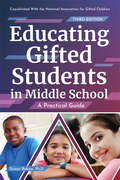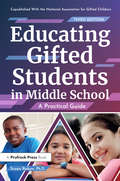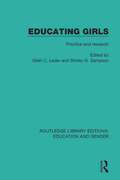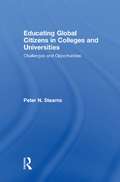- Table View
- List View
Educating Congregations: The Future of Christian Education
by Charles FosterDescribes how to effectively educate congregations.
Educating Congregations: The Future of Christian Education
by Charles R. FosterA leading Christian educator offers a practical guide for revisioning a church's educational program. After identifying the weaknesses in current education programs, Charles Foster offers an alternative vision that is more cooperative, more attentive to the whole of the congregation's life, and that helps people critically correlate the Bible and Christian tradition to their own experience.
Educating Doctors' Senses Through The Medical Humanities: "How Do I Look?" (Routledge Advances In The Medical Humanities Ser.)
by Alan BleakleyEducating Doctors’ Senses Through the Medical Humanities: “How Do I Look?” uses the medical diagnostic method to identify a chronic symptom in medical culture: the unintentional production of insensibility through compulsory mis-education. This book identifies the symptom and its origins and offers an intervention: deliberate and planned education of sensibility through the introduction of medical humanities to the core undergraduate medicine and surgery curriculum. To change medical culture is an enormous challenge, and this book sets out how to do this by answering the following questions: How has a compulsory mis-education for insensibility developed in medical culture and medical education? How is sensibility capital generated, who ‘owns’ it and how is it distributed, mal-distributed and re-distributed? What is the place of resistance (or ‘dissensus’) in this process? How can the symptom of a ‘developed’ insensibility be addressed pedagogically through introduction of the medical humanities as core and integrated curriculum provision? How can both the identity constructions of doctors and doctor–patient relationships be tied up with education for sensibility? How can artists work with clinicians, through the medical humanities in medical education, to better educate sensibility? The book will be of interest to all medical educators and clinicians, including those health and social care professionals outside of medicine who work with doctors.
Educating Doctors: Crisis in Medical Education, Research and Practice
by Stewart WolfAt a time when medical care for the people of the United States is undergoing wrenching change due mainly to vast and costly technological progress, doctors have had to cede much of their initiative and responsibility to third parties. Medicine has become a commercial enterprise. Patients must affiliate themselves with a managed health care organization in order to have access to their doctors. In the hurly-burly of today's techno-medicine, many physicians are too busy to spend time in dialogue with their patients. As a consequence, social and emotional circumstances that have been thoroughly documented to affect physiology and susceptibility to disease are overlooked.Stewart Wolf here critiques the medical establishment and the way those concerned with its various responsibilities discharge them. He puts medicine's responsibilities to society into historical perspective, relating it to social changes. He begins with the ways medical candidates are selected. He continues with commentary on currently designed teaching and learning, the qualities required in a physician and in a medical scientist, and the nature and challenges of disease and what can be done about them. Finally, Wolf provides a useful way of thinking about human biology, to better understand why people become sick or well and what people have to contend with to stay well. Throughout he emphasizes the role of the brain in controlling behavior of all sorts, general and visceral.Wolf emphasizes the regulatory power of the nervous system as it perceives and evaluates life experiences and influences learning, behavior, and susceptibility to disease. Wolf'sgoal is not to supply a recipe for the achievement of better health, but to encourage a better understanding of ourselves and the paths toward health. Educating Doctors reexamines the responsibilities, goals, and activities of the medical establishment. As such it is a must read for policymakers, sociologists, and professionals working in the medical field.
Educating Drew: The Real Story Of Harrop Fold School
by Drew PoveyTelling the remarkable story of Harrop Fold School in Salford, from their unprecedented GBP2.5m debt to being featured in the BAFTA-award nominated Educating Manchester TV series. Drew Povey was one of the youngest Heads in the country when he was appointed aged 32 in 2010. Through sheer determination and strong, visionary leadership, Drew and his management team (including his two brothers) have wiped out the GBP600k a year deficit and are reducing the huge debt - while continuing to get standout results from pupils. Their book reveals the untold story of their struggles, and the unique leadership style that has seen a quite stunning turnaround in a school once labelled one of the worst in the country.
Educating Drew: The Real Story Of Harrop Fold School
by Drew PoveyTelling the remarkable story of Harrop Fold School in Salford, from their unprecedented GBP2.5m debt to being featured in the BAFTA-award nominated Educating Manchester TV series. Drew Povey was one of the youngest Heads in the country when he was appointed aged 32 in 2010. Through sheer determination and strong, visionary leadership, Drew and his management team (including his two brothers) have wiped out the GBP600k a year deficit and are reducing the huge debt - while continuing to get standout results from pupils. Their book reveals the untold story of their struggles, and the unique leadership style that has seen a quite stunning turnaround in a school once labelled one of the worst in the country.
Educating Drug-Exposed Children: The Aftermath of the Crack-Baby Crisis
by Janet Y. ThomasThis is the first book to use teachers' experiences to understand how prenatal drug exposure affects children's' development , and how social construction of the problem influences perceptions within schools.
Educating Emergent Bilingual Youth in High School: The Promise of Critical Language and Literacy Education (Routledge Research in Language Education)
by Jie Y. ParkThis book revolves around educating recently arrived immigrant youth in the United States who are emergent bilinguals. Drawing on a seven-year research collaboration with three ESL teachers in an urban secondary school in the United States, it addresses questions around taking a critical approach to language and literacy education, including what this looks like in everyday practice and what emergent bilingual youth can learn from it. The chapters illustrate the praxis of critical language and literacy education undertaken by everyday ESL teachers, curricular materials and pedagogical practices that promote emergent bilingual youths’ engagement with words and worlds, and finally, a methodological and relational approach to researching with classroom teachers. The book introduces teaching practices such as dialogic problem-posing, translanguaging and translation, the use of multimodal texts, and youth research on language. Arguing for the potential power of critical language and literacy education for immigrant youth and their teachers, this book will benefit educators, researchers, and graduate students in the fields of language and literacy, second language acquisition (SLA), ESL and TESOL pedagogy, and in curriculum studies, education of immigrant children and youth, and multicultural issues in education.
Educating Emergent Bilinguals: Policies, Programs, and Practices for English Learners (Language and Literacy Series)
by Jo Anne Kleifgen Ofelia GarcíaThis accessible guide in a revised and expanded edition introduces readers to the issues and controversies surrounding the education of language minority students in the United States. What makes this book a perennial favorite are the succinct descriptions of alternative practices for transforming our schools and students' futures, such as building on students' home languages and literacy practices, incorporating curricular and pedagogical innovations, using proven-effective approaches to parent engagement, and employing alternative assessment tools. <p><p>The authors have updated their bestseller to reflect recent shifts in policies, programs, and practices due to globalization and the changing economy; demographic trends; and new research on EL pedagogy. A totally new chapter highlights multimedia and multimodal instructional possibilities for engaging EL students. <p><p>This Second Edition is essential reading for all teachers of language-minority students, as well as principals, superintendents, and policymakers. <p><p>Book Features: <p>- Uses the most up-to-date research findings to demonstrate how ignoring children's bilingualism perpetuates inequities in their schooling. <p>- Points out the problems with current policies and practices and proposes more effective alternative methods. <p>- Contrasts the common view of bilingualism as either subtractive or additive with more current understandings of individual bilingualism in translanguaging theories. <p>- Highlights how multimodalities form part of students' communicative repertoire and shows teachers how they can leverage this to engage students.
Educating Engineers for Future Industrial Revolutions: Proceedings of the 23rd International Conference on Interactive Collaborative Learning (ICL2020), Volume 1 (Advances in Intelligent Systems and Computing #1328)
by Michael E. Auer Tiia RüütmannThis book contains papers in the fields of collaborative learning, new learning models and applications, project-based learning, game-based education, educational virtual environments, computer-aided language learning (CALL) and teaching best practices.We are currently witnessing a significant transformation in the development of education and especially post-secondary education. To face these challenges, higher education has to find innovative ways to quickly respond to these new needs. There is also pressure by the new situation in regard to the Covid pandemic.These were the aims connected with the 23rd International Conference on Interactive Collaborative Learning (ICL2020), which was held online by University of Technology Tallinn, Estonia from 23 to 25 September 2020. Since its beginning in 1998, this conference is devoted to new approaches in learning with a focus on collaborative learning. Nowadays the ICL conferences are a forum of the exchange of relevant trends and research results as well as the presentation of practical experiences in Learning and Engineering Pedagogy. In this way, we try to bridge the gap between ‘pure’ scientific research and the everyday work of educators. Interested readership includes policymakers, academics, educators, researchers in pedagogy and learning theory, school teachers, learning industry, further and continuing education lecturers, etc.
Educating Engineers for Future Industrial Revolutions: Proceedings of the 23rd International Conference on Interactive Collaborative Learning (ICL2020), Volume 2 (Advances in Intelligent Systems and Computing #1329)
by Michael E. Auer Tiia RüütmannThis book contains papers in the fields of engineering pedagogy education, public–private partnership and entrepreneurship education, research in engineering pedagogy, evaluation and outcomes assessment, Internet of Things & online laboratories, IT & knowledge management in education and real-world experiences. We are currently witnessing a significant transformation in the development of education and especially post-secondary education. To face these challenges, higher education has to find innovative ways to quickly respond to these new needs. There is also pressure by the new situation in regard to the Covid pandemic. These were the aims connected with the 23rd International Conference on Interactive Collaborative Learning (ICL2020), which was held online by University of Technology Tallinn, Estonia from 23 to 25 September 2020. Since its beginning in 1998, this conference is devoted to new approaches in learning with a focus on collaborative learning. Nowadays the ICL conferences are a forum of the exchange of relevant trends and research results as well as the presentation of practical experiences in Learning and Engineering Pedagogy. In this way, we try to bridge the gap between ‘pure’ scientific research and the everyday work of educators. Interested readership includes policymakers, academics, educators, researchers in pedagogy and learning theory, school teachers, learning industry, further and continuing education lecturers, etc.
Educating Engineers: Preparing 21st Century Leaders in the Context of New Modes of Learning
by Steve Olson National Academy of EngineeringThe National Academy of Engineering's 2012 forum, "Educating Engineers: Preparing 21st Century Leaders in the Context of New Modes of Learning," opened with presentations by six speakers who looked at the future of engineering and engineering education from their perspectives as educators, administrators, entrepreneurs, and innovators. Each speaker focused on just one facet of a tremendously complex picture. Yet together they outlined a new vision for engineering education based on flexible, interactive, lifelong learning and the merge of activities long held to be distinct. This summary of a forum recaps the six speaker's presentations.
Educating English Learners: What Every Classroom Teacher Needs to Know
by Joyce W. Nutta, Carine Strebel, Kouider Mokhtari, Florin M. Mihai and Edwidge Crevecoeur-BryantIn Educating English Learners, Joyce W. Nutta and her colleagues offer practical tools for helping schools and teachers successfully integrate English learners into mainstream classrooms. Drawing on the One Plus model presented in their award-winning book, Preparing Every Teacher to Reach English Learners, the authors now turn their attention to the needs of K–12 teachers who typically have two or three English learners in their classrooms. English learners are not a homogenous group, and the challenges they face vary tremendously. Nutta and her colleagues present protocols and case studies to help pre-service and in-service teachers understand the needs of English learners in their classrooms and differentiate instruction and assessment accordingly. Woven throughout the book are the stories of Gero, Edith, Tasir, and Edgar, four case study students of different ages, backgrounds, and levels of English proficiency. The authors show how the protocols they provide can be applied to adapt sample lessons for students like these, across a range of grade levels, subject areas, and pedagogical approaches. Finally, the authors show how the system can be applied school-wide for a collaborative approach to meeting English learners&’ needs.
Educating Entrepreneurial Citizens: Neoliberalism and Youth Livelihoods in Tanzania (Education, Poverty and International Development)
by Joan DeJaeghereEducating Entrepreneurial Citizens examines the multiple and contradictory purposes and effects of entrepreneurship education aimed at addressing youth unemployment and alleviating poverty in Tanzania. Governments in sub-Saharan Africa face increasing pressure to educate young people through secondary school, supposedly equipping them with knowledge and skills for employment and their future. At the same time, many youths do not complete their education and there are insufficient jobs to employ graduates. The development community sees entrepreneurship education as one viable solution to the double edged problem of inadequate education and few jobs. But while entrepreneurship education is aligned with a governing rationality of neoliberalism that requires individuals to create their own livelihoods without government social supports, the two NGO programs discussed in this book draw on a rights-based discourse that seeks to educate those not served by government schools, providing them with educational and social supports to be included in society. The chapters explore the tensions that occur when international organizations and NGOs draw on both neoliberal and liberal human rights discourses to address the problems of poverty, unemployment and poor quality education. Furthermore, when these neo/liberal perspectives meet local ideas of reciprocity and solidarity, they create friction and alter the programs and effects they have on youth. The book introduces the concept of entrepreneurial citizens—those who utilize their innovative skills and behaviors to claim both economic and social rights from which they had been previously excluded. The programs taught youth how to develop their own enterprises, to earn profits, and to save for their own futures; but youth used their education, skills and labor to provide for basic needs, to be included in society, and to support their and their families’ well-being. By showing the contradictory effects of entrepreneurship education programs, the book asks international agencies and governments to consider how they can go beyond technical approaches of creating enterprises and increasing income, and head toward approaches that consider the kinds of labor that young people and communities value for their wellbeing. This book will be of interest to scholars and practitioners of education and international development, youth studies, African Studies and entrepreneurship/social entrepreneurship education.
Educating Esme: Diary Of A Teacher's First Year
by Esmé Raji CodellEsme Raji Codell has come to teach - and she's not going to let incompetent administrators, abusive parents, gang members, weary teachers, dim-witted principals, angry children, or her own insecurities get in the way. Esme is fresh mouthed yet compassionate; she can be both pigheaded and generous, cynical and charming. In this diary, a record of her frustrations, her achievements, and her struggles to maintain her individuality in the face of bureaucracy, she reveals what it takes to be a genuine teacher. Esme wears costumes in the classroom, dances with the kids during rallies in the auditorium, puts on rousing performances with at-risk kids in the library. Her fifth-graders don't use the reading textbook: "What for? Grown-ups don't read textbooks, unless they're forced. " Math is called Puzzling; "I figured kids at this age come to me with preconceived notions of what they are good at. This way a kid who thinks she's no good in math might turn out to be good at Puzzling." Disciplinary action includes having the "bad boy" of the class be the teacher for a day while Esme misbehaves just as he would. She is twenty-four-year-old woman with the enthusiasm of an elementary school student and the determination of a dedicated teacher. Must reading for every teacher, Educating Esme is not just for educators. This is a story about frustrations in any workplace, about refusing to conform, about taking a stand against mediocrity. By the sheer force of her personality, Esme gives us an exhilarating field trip through a Chicago public school.
Educating Esmé: Diary of a Teacher's First Year (Expanded Edition)
by Esmé Raji CodellA must-read for parents, new teachers, and classroom veterans, Educating Esmé is the exuberant diary of Esmé Raji Codell’s first year teaching in a Chicago public school. <P><P>Fresh-mouthed and free-spirited, the irrepressible Madame Esmé—as she prefers to be called—does the cha-cha during multiplication tables, roller-skates down the hallways, and puts on rousing performances with at-risk students in the library. Her diary opens a window into a real-life classroom from a teacher’s perspective. While battling bureaucrats, gang members, abusive parents, and her own insecurities, this gifted young woman reveals what it takes to be an exceptional teacher. <P>Heroine to thousands of parents and educators, Esmé now shares more of her ingenious and yet down-to-earth approaches to the classroom in a supplementary guide to help new teachers hit the ground running. As relevant and iconoclastic as when it was first published, Educating Esmé is a classic, as is Madame Esmé herself.
Educating Everybody's Children: Diverse Teaching Strategies for Diverse Learners
by Robert W. ColeDesigned to promote reflection, discussion, and action among the entire learning community, Educating Everybody's Children encapsulates what research has revealed about successfully addressing the needs of students from economically, ethnically, culturally, and linguistically diverse groups and identifies a wide range of effective principles and instructional strategies. <p><p> Although good teaching works well with all students, educators must develop an extensive repertoire of instructional tools to meet the varying needs of students from diverse backgrounds. Those tools and the knowledge base behind them are the foundation of this expanded and revised second edition of Educating Everybody's Children. Each strategy discussed in the book includes classroom examples and a list of the research studies that support it. <p><p> The most important thing we have learned as a result of the education reform movement is that student achievement stands or falls on the motivation and skills of teachers. We must ensure that all teachers are capable of delivering a standards‑based curriculum that describes what students should know and be able to do, and that these standards are delivered by means of a rich and engaging "pedagogy of plenty." By these two acts we can ensure that all schools will be ready and able to educate everybody's children.
Educating Everyone: An Introduction to Relational Inclusion in Schools
by Anthony Benedict Alan BravenDrawing on the latest neuroscientific research and rooted in good practice, Educating Everyone presents the concept of Relational Inclusion, encouraging schools to reconsider their traditional perspectives on mental health and behaviour.The authors pose thought-provoking questions about longstanding conventional approaches to behaviour management in schools that have remained largely unchanged since the inception of compulsory state education. They present a range of strategies that extend beyond the needs of individuals with complex requirements who are often isolated as a result of the misguided concept that they can be "taught" to conform. Relational Inclusion is advocated as an inclusive approach that can benefit all children and adults, fostering comprehension of the underlying causes behind behavioural challenges. This book provides an essential framework for responding to students' behaviour that has been tried and tested in real classrooms. Schools play a pivotal role in teaching these essential skills and attitudes, and this accessible resource provides educators with valuable insights and practical strategies for creating a nurturing and supportive environment within school settings. It will appeal to educationalists across the educational sector, including headteachers and policy leaders as well as behaviour leads, classroom teachers, support staff, and anyone who works with children and young people.
Educating Exceptional Children
by Mary Ruth Coleman Samuel Kirk James J. GallagherAuthored by luminaries in the special education field, EDUCATING EXCEPTIONAL CHILDREN introduces readers to each of the thirteen disability categories, and to the needs of children who are gifted and talented. The fourteenth edition continues to focus on the strengths of previous editions, while also providing new material about such important hot topics as genetics, neurology, inclusion, assistive technology, and information processing. The book provides key, research-based teaching methods and strategies for children with various exceptionalities, and also offers analysis of ecological factors that influence the exceptional child in and out of the classroom. This edition also features a new chapter on children with ADD/ADHD, new diagnosis information from the DSM-5, coverage of CEC and Common Core State Standards, the most current teaching techniques for each category, and current coverage of the Response to Intervention Model.
Educating Former Offenders in a Post-incarceration Teaching and Learning Context: A Novel Framework for Rehabilitation through Community Education (Routledge Research in Education)
by Colin Francis O’ConnorThis unique and insightful volume presents the findings of a four-year investigation into the learning experiences of former offenders and outlines a novel framework for guiding those affected by the judicial system towards pathways of hope and possibility through community education initiatives.Following a four-year investigation documenting former offenders’ learning experiences, the book examines subculture research, transformative learning paradigms, and desistance literature to support a more considered, collaborative, and applied approach to educating former offenders in a post-community context, building personal self-worth and positive societal change through community collaboration. Rooted in an autoethnographic methodology combined with first-hand experience and collaboration between the author and former offenders, the book explores the personal, wider social and political factors that influenced the research subjects’ pathways towards crime and substance misuse. The book ultimately suggests alternative approaches to working with, and educating, non-traditional students in a post-release teaching and learning context.Contributing to research into how best to support community reintegration, rehabilitation, and desistance through education, the book will be of interest to researchers, scholars, and postgraduate students involved with post-incarceration education, sociology of education, and non-formal education more broadly. Community Psychiatry and Rehabilitation scholars may also find the work of interest.
Educating Generation Next: Young People, Teachers And Schooling In Transition
by Lucas WalshIs the current industrial model of schooling capable of preparing young people for modern working life? This book provides an unsettling picture of the challenges young people face following the uncertainty of the Global Financial Crisis. It asks whether teachers and schooling are able to provide the skills needed in a contemporary global economy.
Educating Gifted Students in Middle School: A Practical Guide
by Susan RakowEducating Gifted Students in Middle School: A Practical Guide (3rd ed.) helps educators with the challenging task of understanding and meeting the needs of gifted students in middle school. This revised and updated third edition:Provides a rationale and framework that middle schools can use to fill the service gap for gifted and advanced learners.Addresses the needs of learners from diverse backgrounds.Shows how to implement effective program models.Identifies best practices for the classroom.Shares research-based curriculum models.Topics addressed include school organization, instructional strategies in the basic subject areas, cocurricular and summer programs, the missing link of executive function skills, and counseling at-risk gifted learners. Educating Gifted Students in Middle School focuses on creative, practical, and realistic school solutions that create a vital and responsive community for all students.
Educating Gifted Students in Middle School: A Practical Guide
by Susan RakowEducating Gifted Students in Middle School: A Practical Guide (3rd ed.) helps educators with the challenging task of understanding and meeting the needs of gifted students in middle school. This revised and updated third edition:Provides a rationale and framework that middle schools can use to fill the service gap for gifted and advanced learners.Addresses the needs of learners from diverse backgrounds.Shows how to implement effective program models.Identifies best practices for the classroom.Shares research-based curriculum models.Topics addressed include school organization, instructional strategies in the basic subject areas, cocurricular and summer programs, the missing link of executive function skills, and counseling at-risk gifted learners. Educating Gifted Students in Middle School focuses on creative, practical, and realistic school solutions that create a vital and responsive community for all students.
Educating Girls: Practice and Research (Routledge Library Editions: Education and Gender #20)
by Gilah C. Leder Shirley N. SampsonOriginally published in 1989. This book addresses a number of issues integral to the education of girls in Australia. Among these are: teacher practices inside and outside the classroom, co-education versus single-sex schooling, curriculum design, students’ self-esteem and long-term aspirations. Intervention programs which tackle these issues – in mathematics, science and sport – are described and evaluated. Throughout, the collection functions as a meeting ground for practice and current research.
Educating Global Citizens in Colleges and Universities: Challenges and Opportunities
by Peter N. StearnsThis book provides distinctive analysis of the full range of expressions in global education at a crucial time, when international competition rises, tensions with American foreign policy both complicate and motivate new activity, and a variety of innovations are taking shape. Citing best practices at a variety of institutions, the book provides practical coverage and guidance in the major aspects of global education, including curriculum, study abroad, international students, collaborations and branch campuses, while dealing as well with management issues and options. The book is intended to guide academic administrators and students in higher education, at a point when international education issues increasingly impinge on all aspects of college or university operation. The book deals as well with core principles that must guide global educational endeavors, and with problems and issues in the field in general as well as in specific functional areas. Challenges of assessment also win attention. Higher education professionals will find that this book serves as a manageable and provocative guide, in one of the most challenging and exciting areas of American higher education today.
